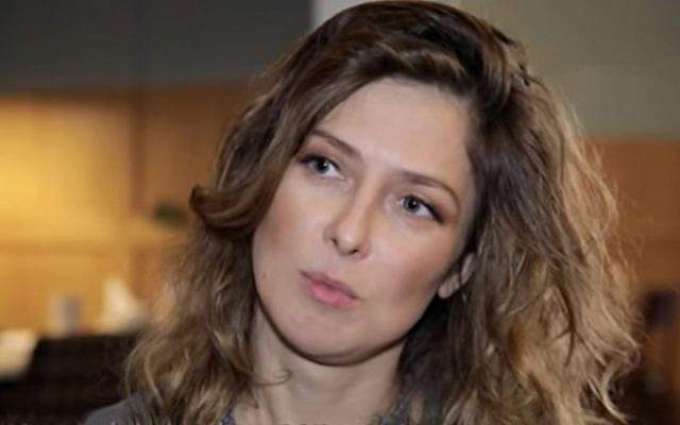Russian journalist Yulia Yuzik, who was released from her detention in Tehran, told Sputnik that her invitation to Iran was a pre-planned provocation and that she had no faith that she would be released
MOSCOW (Pakistan Point News / Sputnik - 11th October, 2019) Russian journalist Yulia Yuzik, who was released from her detention in Tehran, told Sputnik that her invitation to Iran was a pre-planned provocation and that she had no faith that she would be released.Yuzik arrived in Tehran on September 29 at a private invitation, but her passport was seized at the airport for unknown reasons. She was arrested on October 2 at a hotel. At the same time, as the embassy's press attache told Sputnik, Yuzik did not inform the Russian diplomatic mission in Iran about possible problems in the Islamic Republic or about the seizure of her passport, although her relatives talked about potential problems.
Yuzik returned to Moscow on Wednesday morning. She told Sputnik what the reasons for her trip to Iran were and shared the details of her detention.
According to Yuzik, she has been receiving invitations to visit Iran throughout the year. Her previous trip to the Islamic Republic ended very intensely. When the Russian woman was leaving the country, she was warned that she was no longer welcome there.
"I was invited by a man, whom I knew well, my former boss. He is an Iranian and has a direct relationship with the country's intelligence services. He guaranteed me that Iran had no more claims against me, that I was free to come. Moreover, he convinced me that their invitation was a desire to smooth those unpleasant impressions from a year ago," Yuzik said.
In November, the Russian woman will face a serious lung surgery and she received therapy on the eve of the trip. In addition, she has custody of four children.
"I asked decently: if something is wrong, tell me right away. However, I was convinced that it will be safe to make that trip and that they will meet me at the airport. They even sent me a program [of the visit]! It was a provocation from the very beginning, a big setup," Yuzik added.
Yuzik began to suspect something at the airport when people at the passport control did not return her identity document.
"They wrote that I allegedly had problems with the visa, but everything was OK with the visa. When I started asking about the reasons for not returning my passport, they did not explain anything. They spoke Farsi all the time, I was forced to answer in Farsi, they said 'you are in Iran.' I asked them to deport me if there were any problems, but their goal was to force me to come into the territory of the country," Yuzik continued.
The man who was supposed to meet her, the same one who invited her, was at passport control. He told Yuzik that they took her passport in order to delete her data from some system and that she could pick it up the next day in Tehran.
"When I came out, I got into his car and asked him to take me to the Russian consulate. He said no. Imagine that I get out of the car, slam the door, rent another car ... I was actually taken hostage! The next day I was taken supposedly to get my passport. It turned out to be a building of the Islamic Revolutionary Guard Corps, where they kept me for interrogation for about six hours. They did not give me back my passport," the journalist said.
Yuzik was detained in a hotel room the day after the interrogation. The assault team, without explanation, took her to prison. And the next day, according to her, a trial was held.
"The official charge was cooperation with the Israeli secret services and work for the state of Israel. I was in Israel once, in 2004, I do not have an Israeli passport, and I do not have relatives living in Israel. During the prosecution, they referred to people with whom I was chatting on Facebook, people who were born in Israel. There were only two or three people. They said that I came to Iran to collect information," Yuzik recalled.
Yuzik was not able to meet with her lawyer. The Russian woman also received a very unexpected response to her request to contact the consulate.
"They told me that the Russian embassy was officially informed about my arrest on the first day. They said that no one was interested in me. I sat there and thought that no one cared and that I will never get out of there," she said.
On the day of her release, Yuzik did not know where she was being taken up until the last moment.
"I went to bed in the evening there were several blankets on the cell's floor, nothing else. Somewhere at 9-10 p.m. a woman in black came in and said 'let's go.' I did not know where we were going: execution, another prison. When they told me 'airport,' I was sure that they were lying. I did not believe up until the last moment that I will come back," Yuzik recalled.
Now the Russian journalist is in Moscow, at home with her children. Her mother visits her from time to time.
"I have my own thoughts on what to do next, but I cannot tell everything. The situation is very traumatic for me, it is only starting to hit me, and yesterday I was in shock. I am waiting for an understanding of what I can say and do. This story was unique in a certain way: Iran did all those things, knowing that Russia is one of its few partners today. It is unprecedented and boundless," she concluded.
Iranian authorities claimed that Yuzik's detention was not connected with espionage, adding that the journalist had problems with her visa.




